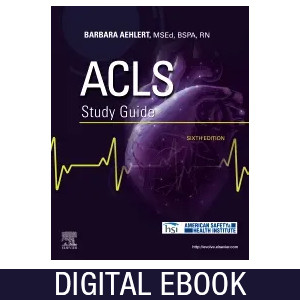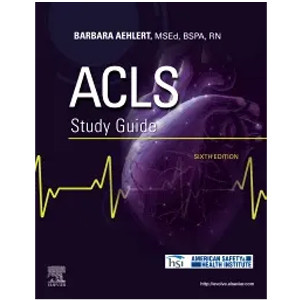HSI ACLS Program Supplementary Info
Intended Audience
The HSI Advanced Cardiac Life Support (ACLS) program is designed for healthcare providers who either direct or participate in cardiopulmonary emergencies and resuscitation efforts. This includes medical professionals trained in high-quality life support, rhythm recognition, and emergency intervention.
Certification Period
The certification is valid for up to two years from the month of issue. Spaced practice every 3 to 6 months is strongly recommended to maintain skills and knowledge.
Recommended Time to Complete
- Initial Training: Approximately 15 hours
- Renewal Training: Approximately 7 hours
Instructional Elements
The HSI ACLS program includes several instructional materials to support learning:
- HSI ACLS Instructor Materials, including:
- Instructor Resource Guide
- Scenario Sheets
- Student Book, ACLS Study Guide, 6th Edition, and the ACLS Ebook Study Guide, 6th Edition, published by Elsevier
- HSI ACLS Program Slide Presentation
Participant Prerequisites
All individuals who participate in an ACLS class must be previously trained and skilled in:
- High-quality basic life support (HQ-BLS)
- Reading and interpreting basic electrocardiograms (ECGs)
- Understanding basic resuscitation pharmacology, preparing, and administering essential medications
Delivery Options
The ACLS training is provided in a scenario-based, case study format designed to enhance hands-on skills and decision-making in emergency cardiovascular care.
Class Ratios
To ensure effective learning and hands-on practice, the class is structured with recommended and maximum ratios:
- Student-to-Instructor Ratio: Recommended 6:1, Maximum 10:1
- Student-to-Manikin Ratio: Maximum 3:1
Student Certification Requirements
To achieve certification, students must meet the following criteria:
- Written Evaluation: Successful completion with a score of 75% or higher.
- Performance Evaluation: Demonstrate skill competency in a team setting, including:
- High-Quality BLS
- Respiratory arrest management
- Cardiac rhythm management (including pulseless VT/VF and two other rhythms)
Class Topics Covered
The HSI ACLS course covers a comprehensive range of emergency procedures and life-saving techniques, including:
- Chain of Survival & High-Quality Cardiopulmonary Resuscitation
- Patient Assessment & Resuscitation Therapies
- Respiratory Compromise
- Cardiac Rhythm Management
- Bradycardias
- Tachycardias
- Acute Coronary Syndromes
- Acute Ischemic Stroke
- Resuscitation Simulation Equipment
- Airway Management & Adult BLS
- Case Studies
- High-Quality Skills and Teamwork
Continuing Education Credits
The ACLS program provides approved EMS continuing education hours (CEH) accredited by the Commission on Accreditation of Pre-Hospital Continuing Education (CAPCE), for which HSI is an accredited organization:
- Initial class: 15 hours Advanced CEH
- Renewal class: 7 hours Advanced CEH
Key Benefits of HSI Advanced Cardiac Life Support (ACLS) Certification
The HSI ACLS Certification program provides several key benefits:
- Comprehensive Scenario-Based Training: Focuses on real-life resuscitation and emergency scenarios to build practical skills.
- Up-to-Date Guidelines: Reflects the latest standards and practices for emergency cardiovascular care.
- High-Quality Skill Development: Emphasizes hands-on skills in CPR, respiratory management, and cardiac rhythm handling.
- Team-Based Competency: Training involves teamwork simulation to mirror real emergency settings.
- Continuing Education Credits: Recognized for EMS continuing education credits by CAPCE.
- Two-Year Certification: Ensures participants remain knowledgeable and prepared for emergencies.
- Skill Maintenance Recommendations: Spaced practice every 3 to 6 months is recommended to maintain proficiency.




